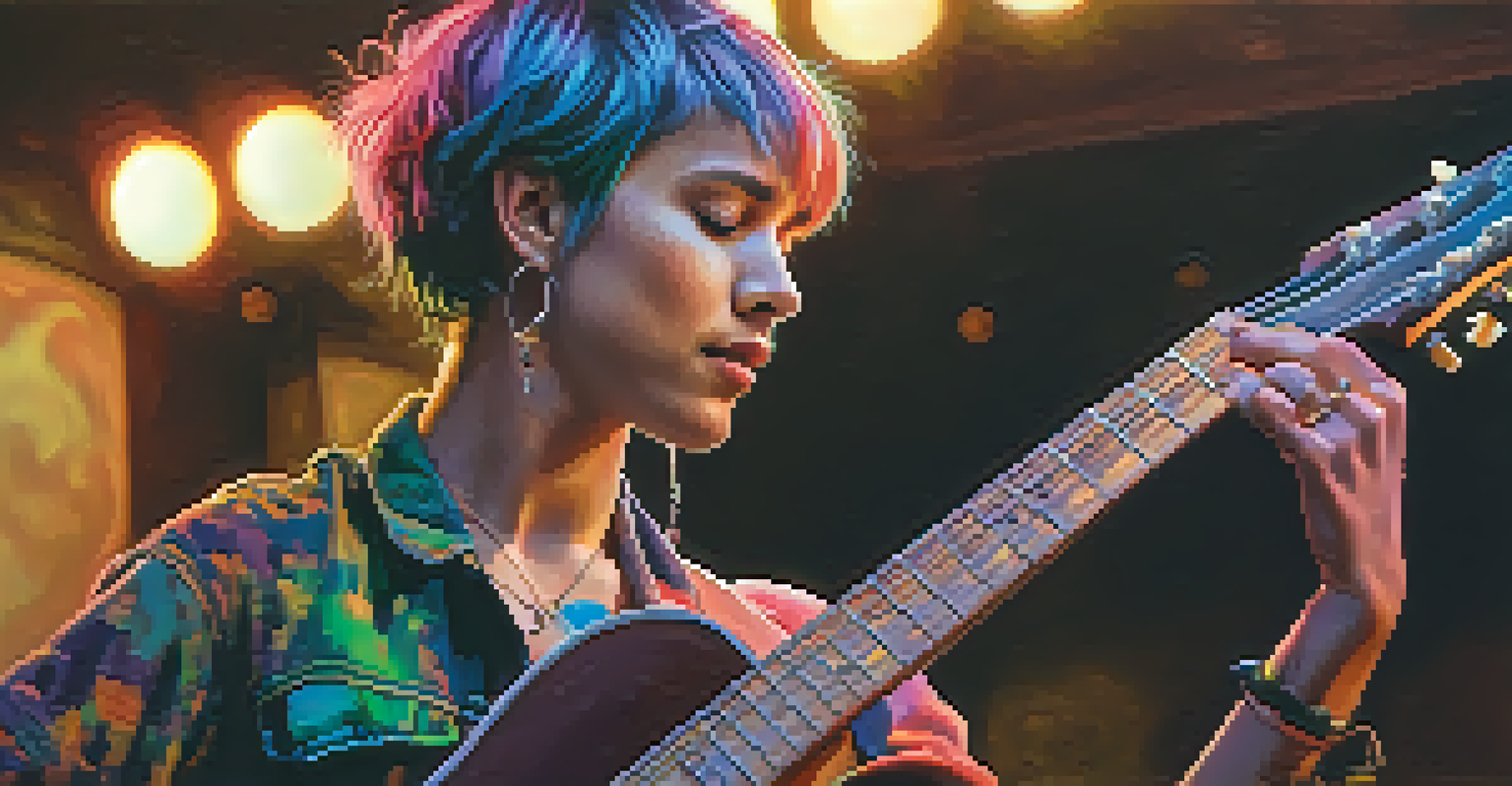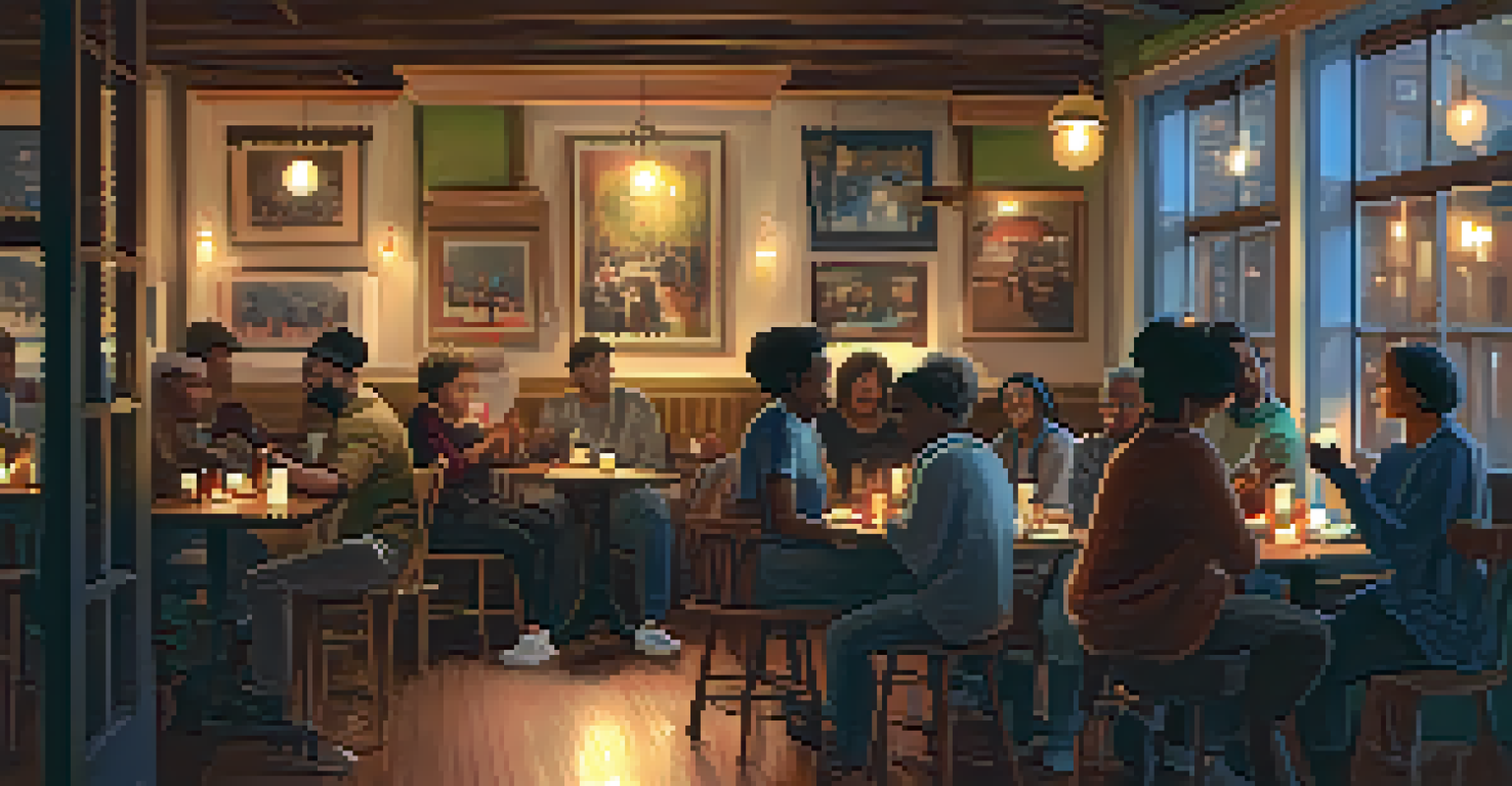The Role of Music in Shaping Transgender Identity and Activism

Understanding the Connection Between Music and Identity
Music has long served as a powerful medium for self-expression, and for many in the transgender community, it is a vital tool for exploring and affirming their identities. Through lyrics and melodies, artists can convey experiences that resonate with feelings of gender dysphoria, acceptance, and transformation. For instance, songs that discuss personal journeys can empower listeners to embrace their true selves, fostering a sense of belonging.
Music can change the world because it can change people.
Furthermore, music offers a safe space for individuals to confront their emotions and navigate their identities. Whether it's through singing along to empowering anthems or creating personal playlists, the act of engaging with music can be therapeutic. This emotional connection often helps individuals articulate their feelings in ways that words alone might not capture.
Ultimately, music serves as a bridge between personal identity and collective experience, uniting diverse voices within the transgender community. It encourages individuals to share their stories, creating a rich tapestry of experiences that can inspire others. Thus, the relationship between music and identity is not just personal; it resonates across communities, fostering solidarity.
Music as a Catalyst for Transgender Activism
Throughout history, music has been an essential vehicle for activism, providing a platform for marginalized voices to be heard. In the transgender community, artists have often used their music to challenge societal norms and advocate for equality. Songs addressing issues like discrimination, violence, and acceptance serve not just as personal expressions but as rallying cries for broader social change.

For example, artists like Sam Smith and Janelle Monáe have woven their experiences as transgender or non-binary individuals into their music, raising awareness of the challenges faced by the community. Their lyrics often highlight the struggles for acceptance and the fight against prejudice, inspiring listeners to join the movement for LGBTQ+ rights. This integration of activism into music helps to mobilize fans and listeners, turning them into allies.
Music Empowers Transgender Identity
Music serves as a vital tool for self-expression and affirmation within the transgender community, helping individuals navigate their identities.
Moreover, music festivals and events often serve as spaces for activism, where artists and audiences come together to celebrate diversity and advocate for human rights. These gatherings create a sense of community and purpose, reinforcing the idea that music can ignite collective action. By leveraging their platforms, musicians can amplify critical messages and encourage listeners to engage in advocacy.
Iconic Songs that Resonate with Transgender Experiences
Certain songs have emerged as anthems within the transgender community, resonating deeply with the experiences of identity and struggle. For instance, tracks like 'Born This Way' by Lady Gaga celebrate individuality and acceptance, empowering listeners to embrace who they are. The catchy chorus and uplifting message have made it a staple at pride events and gatherings.
The role of music is to bring people together, to create a community.
Similarly, 'Transgender Dysphoria Blues' by Against Me! delves into the pain and challenges of gender dysphoria, providing an honest portrayal of the journey many face. The raw emotion in the lyrics offers validation to those who might feel isolated in their struggles, reminding them they are not alone. Such songs can be incredibly impactful in promoting understanding and empathy.
These iconic tracks not only provide comfort but also give voice to the frustrations and joys of the transgender experience. They illustrate how music can transcend personal narratives, forging connections among those who share similar stories. In this way, music continues to play a vital role in both individual healing and collective empowerment.
The Role of Music in Community Building
Music has an unparalleled ability to bring people together, fostering a sense of community among transgender individuals and their allies. Whether through concerts, open mic nights, or online platforms, music events create spaces where people can share their stories and experiences. This communal aspect can be especially important for those who may feel isolated or marginalized in other areas of their lives.
In addition, local music scenes often become hubs of support, where artists and fans can rally around shared values of inclusivity and acceptance. These environments encourage collaboration and creativity, allowing individuals to express themselves freely. The connections formed in these spaces can lead to lasting friendships and a stronger community.
Music Fuels Transgender Activism
Artists use music as a platform to challenge societal norms and advocate for LGBTQ+ rights, turning personal experiences into rallying cries for broader social change.
Ultimately, the role of music in community building transcends individual expression, fostering solidarity and support. By uniting listeners through shared experiences and emotions, music helps to create a vibrant, interconnected network that champions diversity and inclusion within the transgender community.
The Influence of Social Media on Music and Activism
In the digital age, social media has transformed how music is shared and consumed, providing artists with unprecedented opportunities to connect with audiences. Platforms like Instagram, TikTok, and YouTube enable musicians to share their messages instantly, reaching a global audience. This accessibility has allowed transgender artists to showcase their work and advocate for their rights more effectively than ever before.
Moreover, social media serves as a powerful tool for activism, amplifying voices and movements that might otherwise go unheard. Hashtags like #TransRightsAreHumanRights and #PrideMonth create virtual spaces for discussion and solidarity, often intersecting with music promotion. When artists share their stories alongside their music, they not only engage their fans but also educate them on critical issues facing the transgender community.
The impact of social media extends beyond individual artists; it fosters a sense of global community among supporters of transgender rights. By sharing music that resonates with these themes, users can contribute to discussions, organize events, and raise awareness. In this way, the synergy between music and social media enhances activism and fosters a more inclusive society.
Challenges Faced by Transgender Musicians
Despite the many opportunities music provides, transgender musicians often face significant challenges within the industry. From discrimination and bias to the struggle for representation, the road to success can be fraught with obstacles. Many artists must navigate a complex landscape where their identities are often misunderstood or marginalized, making it difficult to gain recognition.
Additionally, the pressure to conform to societal standards can be overwhelming for transgender artists. They may feel compelled to present themselves in ways that align with traditional gender norms to secure opportunities and acceptance. This struggle for authenticity can create internal conflicts, as artists grapple with remaining true to themselves while seeking commercial success.
Community Building Through Music
Music fosters a sense of belonging and support among transgender individuals and allies, creating spaces for shared stories and collective empowerment.
Ultimately, these challenges underscore the importance of advocacy and support within the music industry. By creating spaces that prioritize inclusivity and representation, the industry can help uplift transgender artists. The journey may be difficult, but the resilience and talent of these musicians continue to shine through.
The Future of Music and Transgender Activism
As society continues to evolve, the intersection of music and transgender activism holds exciting possibilities for the future. With increasing visibility and acceptance of transgender individuals, more artists are stepping into the spotlight to share their stories. This shift not only enriches the music landscape but also inspires the next generation of creators to express their identities unapologetically.
Moreover, the growing support for LGBTQ+ rights and representation in the music industry can lead to more collaborative projects and initiatives. Festivals and events that highlight transgender artists are becoming more common, providing platforms for their voices. As these movements gain momentum, we can expect to see music play an even more significant role in advocating for equality and acceptance.

In conclusion, the future of music and transgender activism is bright, with endless possibilities for connection, expression, and change. As artists continue to use their platforms to challenge societal norms and inspire others, the music industry can become a catalyst for transformation. By championing diversity and fostering understanding, music can pave the way for a more inclusive world.